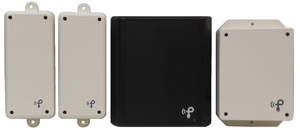PITTSBURGH, PA--(Marketwire - Apr 20, 2011) - Powercast Corporation, a leader in RF-based wireless power and energy-harvesting technology, today announced its Lifetime Power® Wireless Sensor System for wireless environmental monitoring in HVAC control and building automation. Remote radio frequency (RF) transmitters broadcast RF energy that perpetually powers wireless sensor nodes without batteries or wires.
The Powercast wireless sensor system is composed of three parts: a family of battery-less sensor nodes embedded with Powercast's Powerharvester® receivers so they may be powered wirelessly, a WSG-101 Building Automation System (BAS) Gateway, and Powercast's TX91501 Powercaster® transmitter.
The first of the family of sensor devices, available today, is the WSN-1001 Wireless Temperature and Humidity Sensor. Additional wirelessly-powered sensors to measure CO2, pressure, light level, motion and other conditions will follow shortly.
In the wireless powering system, a single transmitter or a network of them power multiple sensor devices. Powerharvester receivers embedded inside the sensor nodes receive RF energy up to 60-80 feet away from the Powercaster transmitters broadcasting radio waves at 915 MHz (a frequency commonly used in industrial and consumer devices). The receivers then convert the RF energy into DC current to power the sensors wirelessly, similar to RFID, but with longer range and greater functionality. Broadcasted RF energy can reach and power sensors even through walls, above ceilings, and behind objects, and provides a reliable and predictable energy source as opposed to pure ambient energy-harvesting technologies such as indoor solar, thermal, or vibration.
The WSG-101 BAS Gateway can scale up to 100 sensor nodes and 800 sensor points for large-scale deployment. The gateway interfaces to wired BAS networks via industry-standard protocols, including BACnet, Modbus, Metasys, and LonWorks. The sensors and gateway communicate wirelessly at 2.4GHz using 802.15.4 radios which users can set to channels that will not interfere with, nor be interfered by, Wi-Fi networks.
Powercast estimates that a battery-less, wirelessly-powered sensor system could save users 40-50% over the installed cost of wired sensors and controllers for building automation systems, and can also eliminate the future and repeated maintenance cost of battery replacement and disposal.
Powercast developed its wireless sensor system using the company's core RF transmitter (Powercaster) and receiver (Powerharvester) energy-harvesting technology, and the other devices included in Powercast's P2110-EVAL-01 Energy Harvesting Development Kit for Wireless Sensors. The receiver embedded in the sensor nodes is based on Powercast's award-winning P2110 Powerharvester receiver, which is available for OEMs to design into their own products.
"Powercast's wirelessly-powered sensors offer the long-term predictability of wired sensors with the deployment flexibility of battery-powered systems," said Harry Ostaffe, vice president of marketing and business development at Powercast. "We look forward to its wide-scale deployment and to further adoption of our core wireless power technology by other sensor OEMs."
The fully-installed cost of the Lifetime Power Wireless Sensor System, including all hardware (sensors, transmitters and BAS gateway) and labor, is estimated to be around $300 per node for typical, multi-node deployments. A starter kit (2 wireless temperature and humidity sensors, a transmitter and a BAS gateway) is available for $799.
About Powercast (www.powercastco.com)
Powercast Corporation is a leading innovator of RF energy harvesting and wireless power technology. Founded in 2003, Powercast's proprietary core technology and related intellectual property pioneered the model for completely untethered electronic devices by transmitting and harvesting common radio waves similar to those in wireless communications. Powercast's technologies eliminate or reduce the need for batteries, extend sensor networks into hard-to-service locations, and enable greater system efficiency in applications such as building automation and energy management.
Editorial note: Downloadable photos are available from:
+1 214-363-3460
